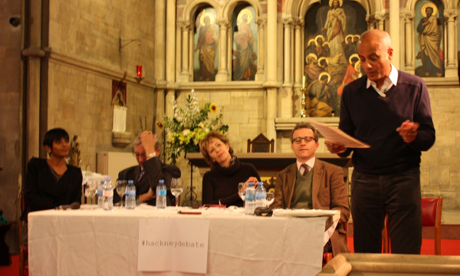The Hackney Debate – Secondary schools: is parental choice paramount?

BBC newsreader George Alagiah with the panel of speakers: Sir Mike Tomlinson, Andreas Wesemann, and Melissa Benn. Photograph: Paul Bolding
Perhaps for the first time in their history, Hackney’s schools have a lot to lose. It’s not surprising, then, that this year’s Hackney Debate focused on education, an issue that is particularly resonant in the borough.
The debate, entitled ‘Secondary schools: is parental choice paramount?’ brought together some of the loudest voices in education, both locally and nationally, to St Peter’s Church on De Beauvoir Road on 30 November.
BBC newsreader and Hackney resident George Alagiah chaired the debate, and the panel included campaigner and author of School Wars Melissa Benn; Sir Mike Tomlinson, who was chair of The Learning Trust in Hackney from 2002 to 2012; Andreas Wesemann, founder of the Hackney New School; and BBC education correspondent Reeta Chakrabarti.
It is hard to imagine an area more ripe for this debate than Hackney. The introduction of academies into the borough has always been controversial, but Hackney’s ‘family of schools’, which includes both academies and maintained schools held to account by The Learning Trust, has brought widespread improvement in the borough. On average 62.5 per cent of Hackney’s GCSE students achieve five A to C marks including English and maths, whilst the national average sits at 59 per cent.
But the rapid expansion of the academies and free schools programme stands to tip the balance as the first free schools set up shop in the borough, diversifying the education landscape to include new schools from a range of providers.
Last month’s debate centred around some ideological differences, as well as disagreements over how to implement the fundamentals of a good education, such as teaching and leadership.
Melissa Benn, who campaigns for preserving local authority control, called for more consistency – as opposed to more diversity – within a system that “makes parental choice less relevant.”
Andreas Wesemann defended the principle of experimentation outside the local authority. “I haven’t been persuaded that the local authority structure is the only device capable of delivering not only good but also fair education,” he explained.
Sir Mike Tomlinson insisted the productive approach to parental choice is a matter of ensuring schools have extra capacity. “The only way to guarantee every child a good education is for every school to be ‘good or better’,” he said.
However, as is inevitable in an intimate debate, some important voices were missing, leaving Wesemann, founder of the music-based Hackney New School, to carry the torch alone for free schools, when he represents only
one of three such schools to open here in September 2013.
The Olive School, a Muslim faith primary school, which claims it will “welcome applications from families of all faiths and none” and promote “community cohesion”, has been organised by the Tauheedul Free Schools’ Trust.
Then there is the STEM Academy for 16-19 year olds, formed by the not-for-profit Skills and Development Agency and set to open in Tech City in Shoreditch. STEM places a heavy focus on science, technology, engineering and maths (so-called STEM subjects) and its ethos is steered more towards employability and vocational skills rather than traditional subjects.
A disproportionate focus was placed on Wesemann’s project at the expense of the larger debate. More than once during the evening, the discussion was derailed from the crux of the matter, as Wesemann fielded questions from the audience on the merits of his ‘pet project’, and about whether he had worked as a strategist for the Malaysian government.
Wesemann’s personal life has been a sparring point for his critics. The phrase “he’s a banker” echoed through the pews as guests took their seats, and again as they got up to leave.
Wesemann lives in De Beauvoir and part owns a local pub. STEM and Olive are both run by larger umbrella organisations.
Broader issues around the structure of the new reforms provided perhaps a more productive basis for debate. The erosion of PGCE qualifications, for example, and the subsequent liberty given to free schools and academies to hire teachers without formal qualifications, is seen by many as an insult to the profession that will be difficult to heal.
Free school proponents invariably state their commitment to the teaching profession – but their commitment to teaching unions remains an important issue. As Benn put it: “Andreas doesn’t denigrate teachers, no – but the government does.”
Ending on a high note, Tomlinson reassured the audience that even if the Government’s plans spin out of control, Hackney’s provision may be able to regulate itself:
“Hackney has a very good service. Look after it, and shout about it if it’s not doing what it’s meant to do. We will listen.”
